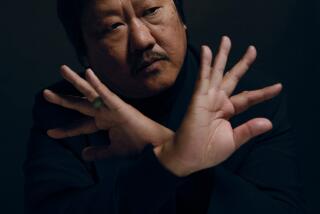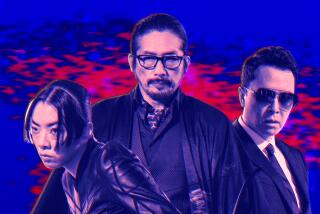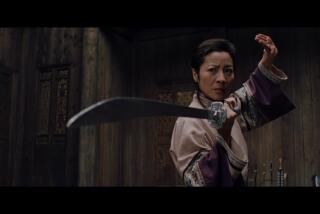Hidden No Longer
- Share via
A masked thief. A rousing rooftop pursuit. Kung fu masters locked in mortal combat one minute, united against a common enemy the next. It could be a description of last year’s Oscar-winning “Crouching Tiger, Hidden Dragon.” But it isn’t. This story belongs to the 1993 Hong Kong martial arts film “Iron Monkey.”
“Nothing is really new under the sun, right?” Donnie Yen says and smiles, and with good reason. Eight years after the fact, the movie that helped catapult him to stardom in Hong Kong is finally being released in the U.S. on Friday, riding the wave of “Crouching Tiger’s” success and generating speculation as to whether Yen’s star may at last begin to rise over Hollywood as well.
Few would deny that the China native has the credentials to be taken seriously in the U.S. Raised primarily in Hong Kong and Boston, he is the most versatile and cosmopolitan of Hong Kong’s major action stars, skilled in a wide variety of martial arts, fluent in English and unencumbered by the typecasting with which Asian action stars are often unfairly saddled. And Yen is one action star less concerned with action than acting.
“Obviously, you want to see great martial arts,” he says. “But ultimately it’s about interpretation, how you act, how you perceive a character. Can you communicate with the audience? Can you make them like you? Can you get them excited about your performance? I think that’s more important than what you can do physically.”
“There are a number of ways to describe his appeal, but when all else fails you’d have to say charisma,” says Mark Gill, president of Miramax, Los Angeles, which is releasing the film. “Certainly ability, of course. But then you could say that Jet Li has tremendous ability, as does Jackie Chan. But I think in Donnie’s case it’s just enormous charisma.”
Technically, Yen’s Hollywood career began last year with a brief role in “Highlander: Endgame,” on which he also served as fight choreographer. But it’s “Iron Monkey” that Miramax is betting will elevate him to the next level.
Among fans of Hong Kong cinema, “Iron Monkey” has long been a revered favorite, a seminal component of the so-called Hong Kong New Wave that, during the 1980s and 1990s, helped establish the careers of such icons as Jet Li, Tsui Hark, John Woo, Chow Yun-Fat, Michelle Yeoh and, of course, Jackie Chan. Produced and co-written by “Once Upon a Time in China” director Tsui and directed by “Crouching Tiger” wirework master Yuen Wo-Ping, “Iron Monkey” owes much of its loyal following to a clever melding of legend and history.
Set in 1860 China, it centers on two larger-than-life figures--the titular masked hero, played by Yu Rong-Guang, and real-life Chinese patriot and martial arts pioneer Wong Kei-Ying, played by Yen. At first pitted against each other by a corrupt official seeking to catch the Zorro-like Iron Monkey, they eventually join forces in the interest of justice.
“Frankly, before I made ‘Iron Monkey’ I’d never heard of this story,” Yen confesses in a recent interview. “But after ‘Once Upon a Time in China,’ Tsui Hark was looking to produce something unique. So he was digging around and found this household story about a Robin Hood-type of character. He wanted to build on that so he added in the character of Wong Kei-Ying.”
Mother Becomes His Martial Arts Teacher
Chinese folklore and movies have historically focused more on Wong Kei-Ying’s equally famous son, the great turn-of-the-century hero Wong Fei-Hong, portrayed in the “Once Upon a Time in China” films by Jet Li and the “Drunken Master” films by Jackie Chan. Here, however, the younger Wong is depicted as a boy (though played by a girl) still living in the shadow of a famous father.
It’s a filial dynamic that Yen understands intuitively from firsthand experience. Yen was still an infant when an exit visa enabled him and his father to depart for Hong Kong, leaving Yen’s mother behind in China for the better part of the Cultural Revolution. During this time Yen’s mother, Bow Sim Mark, studied martial arts as a form of physical therapy but soon emerged as a budding master herself. When the family was finally reunited eight years later, young Donnie became his mother’s student.
By the time Yen was a teenager, he had a new baby sister and the family had relocated again to Boston, where his father assumed the editorship of a Chinese-language newspaper while his mother’s reputation as a teacher continued to grow. But Donnie was no longer her ideal student. “I never listened exactly to what she taught me,” he says with a mischievous grin. “I’d change things here and there. And she had a problem with that to the point where it became unbearable. So she sent me back to China to train.”
Only 16 at the time, Yen studied the art of wushu, a modern-day martial arts variant that blends athletics and traditional kung fu. His skill earned him a spot on the same Beijing Wushu Team from which Jet Li had previously emerged as a star-in-waiting. But Yen’s innate rebelliousness and reluctance to embrace any single style of martial arts soon found him headed back to Hong Kong, his soul-searching begun anew. And that’s when he bumped into Yuen Wo-Ping.
“Yuen Wo-Ping’s oldest sister used to be a student of my mother’s,” he recalls. “And he was looking for a youngster to star in his next film. His sister mentioned that I had just come back from training in China, so he called me up and we went to lunch.” Yuen was sufficiently impressed to call Yen back for a rigorous, physical screen test, which he passed.
Yen’s debut film, “Drunken Tai Chi,” provided a first-rate showcase for his blinding speed and seething intensity, the very qualities that have helped set him apart from more traditional stars like Li and Chan. From his classic, climactic battle against Jet Li in “Once Upon a Time in China 2” to his seriocomic performance as Michelle Yeoh’s confused but well-meaning suitor in “Wing Chun,” Yen bucked the Hong Kong establishment by attaining stardom without an identifiable persona. From his point of view, however, it’s been a mixed blessing.
“In one aspect, it’s unfortunate,” he says. “I have not made a film that I can identify myself with, a role that I can call my signature. ‘Iron Monkey’ was on the path, but it still isn’t Donnie Yen. That was Wong Kei-Ying. And I think most actors should strive to accomplish that, to play the character as best as possible. But I also think an actor should have their own identity.”
Even as Yen hungrily pursues that elusive signature role, his performance in “Iron Monkey” has continued to win fans, most notably inside the Miramax hierarchy, where Asian films have become a growing passion. In a break from past practice, Miramax is releasing “Iron Monkey” on about 1,000 screens, the first time the company has widely distributed a martial arts picture subtitled and without the advantage of an established star.
Releasing the film with its original Cantonese-language track is an especially noteworthy move, something the company resisted even on its releases of high-profile Jackie Chan favorites like “Supercop, “The Legend of Drunken Master” and “Twin Dragons.”
“‘Crouching Tiger’ was the point of critical mass where nobody could disagree anymore and had to admit there was something there,” explains Gill. “And with that audience acceptance, there come new opportunities to try more new things.”
When asked whether or not there might be room for Yen alongside the budding stateside careers of Li and Chan, Gill cites historical precedent.
“People used to say that there were only a couple of African American actors who could really do anything at the box office. And now that’s been proved completely untrue.... . I think the same is going to apply with Asian stars who, for the longest time, it’s been tough for. I think that’s all about to change.”
Yen has already completed work on “Blade 2,” once again doing double duty as fight choreographer and actor, playing one of Wesley Snipes’ “good vampire” allies. Also in the works is the film “Bulletproof Monk” for “Windtalkers” producer Terence Chang and the John Woo-produced television series “Sinner,” which was developed with Yen in mind. But first he will take another trip behind the camera to direct the Japanese version of “Charlie’s Angels.” .
“All the money and fame and comfort, I don’t take that for granted,” he says. “But at the same time I have a philosophy to be happy at what you do. Because you can accomplish so much, but if you’re unhappy, it’s not worth it.”
More to Read
Only good movies
Get the Indie Focus newsletter, Mark Olsen's weekly guide to the world of cinema.
You may occasionally receive promotional content from the Los Angeles Times.








